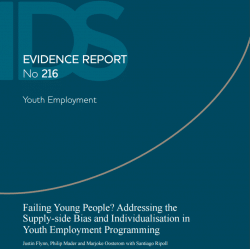- International development actors increasingly focus on youth employment as a key development challenge.
- This report problematizes two tendencies in today’s youth employment policies: 1) the supply-side bias; i.e. policy makers often fail to address issues of labour demand and structural problems underpinning youth employment; and 2) the narrow, economic and individualistic approach towards youth that fails to see they are embedded in social relationships that greatly influence their choices and opportunities.
- Some practical recommendations for policy makers to more adequately address the issue of youth unemployment include: 1) prolonging time spent in full-time schooling to reduce the aggregate supply of young people’s labour while at the same time equipping them with better knowledge and skills. 2) Creating internships and on-the-job skills-training programmes that are rewarded with, for instance, a donor- or state-funded ‘youth stipend’. 3) Supporting small-scale farming to make subsistence more feasible, thereby giving young people more options outside the already saturated labour market. 4) Creating jobs through large-scale welfare programmes such as infrastructure construction. 5) Incorporating youth social relationships more explicitly in interventions, e.g. by soft skills training on how to negotiate personal and family interests, or how to invest in more formal social relationships, either financially or otherwise. 6) Including notions of rights, equality and participation into programmes, especially in terms of young women’s empowerment.










